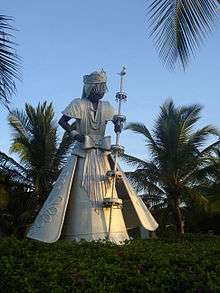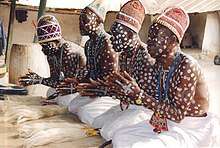Ọbatala
Obatala (known as Obatalá in Latin America or Oxalá in Brazil) is an Orisha. He is believed to be the Sky Father and the creator of human bodies, which were brought to life by the smooth breath of Olodumare. Obatala is the father of all Orishas (irunmole or imole). His principal wife is Yemoo.
| Ọbatala | |
|---|---|
Human Creation, The Sky, Silver, White, Purity, Handicapped people | |
| Member of Orisha | |
 Statue of Obatala in Costa do Sauípe, Bahía | |
| Other names | Obatala or Obatalá; (obataasha)Ochala or Oxalá; and Orichalá or Orixalá |
| Venerated in | Yoruba religion |
| Color | White |
| Region | Nigeria, Benin, Latin America |
| Ethnic group | Yoruba |
| Personal information | |
| Spouse | Yemoo |
Obatala was authorized by Olodumare to create land upon the water beneath the sky. Due to his efforts, the first Yoruba city, Ife, was founded. Obatala is Olodumare's representative on Earth and the shaper of human beings.[1]
According to the oral traditions of Ife, the mortal Obatala served as king of Ife during its classical period. His throne was lost to the lineage of his rival Oduduwa at some point during the 12th century CE.
Following Obatala's posthumous deification, he was admitted to the Yoruba pantheon as an aspect of the primordial divinity of the same name.
In Africa
Primordial Obatala

According to the tenets of the Yoruba religion, Obatala is one of the oldest of all of the orishas and was granted authority to create the Earth. Before he could return to heaven and report to Olodumare, Oduduwa usurped his responsibility (due to Obatala's being drunk at the time). He/she took the satchel that Olodumare had given Obatala to aid him in creation, and used it to create land on the primeval ocean. A great feud ensued between the two siblings.
Mortal Obatala
Oba Obatala was a king in Ife that was deposed by Oduduwa and his supporters. This is re-enacted every year in the Itapa festival in Ife. Ultimately, following the war between Obatala on the one hand and Oduduwa and his sons on the other, the latter were able to subsequently establish a dynasty with the former's reluctant consent.
It appears from the cult dramas of the Itapa festival that Obatala was a dying and rising god. He left his temple in the town on the seventh day of the festival, stayed in his grove outside the town's precincts on the eighth day, and returned in a great procession to his temple on the ninth day.
In the Americas
Santería

Obatalá (also known as Ochalá or Oxalá; Orichalá or Orixalá) is the oldest "Orisha funfun" ("white deity"), referring to purity, both physically and symbolically as in the "light" of consciousness. In Santería, Obatalá is syncretized with Our Lady of Mercy and Jesus Of Nazareth. Obatalá is said to have an equal number of male paths as female paths, but more often crowns women in part because men are traditionally crowned in Ifá in many lineages.
Candomblé
In Candomblé, Oxalá (Obatalá) has been syncretized with Our Lord of Bonfim; in that role, he is the patron saint of Bahia. The extensive use of white clothing, which is associated with the worship of Oxalá, has become a symbol of Candomblé in general.[2] Friday is the day dedicated to the worship of Oxalá. A large syncretic religious celebration of the Festa do Bonfim in January in Salvador celebrates both Oxalá and Our Lord of Bonfim; it includes the washing of the church steps with a special water, made with flowers.
Snails
The snail Achatina fulica is used for religious purposes in Brazil as an offering to Obatala. It is seen as a substitute for the African Giant Snail (Archachatina marginata) that is used in Yorubaland, because they are known by the same name (Igbin, also known as Ibi) in both Brazil and Yorubaland.
Oriki (praise names)
- Oluwa Aye - Lord of the Earth.
- Alabalashe - He who has divine authority.
- Baba Arugbo - Old Master or Father.
- Baba Araye - Master or Father of all human beings.
- Orishanla (also spelled Orishainla or Oshanla) - The arch divinity.
See also
Bibliography
- Idowu, E. Bolaji: Olodumare: God in Yoruba Belief, London 1962.
- Elebuibon, Yemi: Adventures of Obatala, Pt. 2.
- Lange, Dierk: "The dying and the rising God in the New Year Festival of Ife", in: Lange, Ancient Kingdoms of West Africa, Dettelbach 2004, pp. 343–376.
References
- Tales of Yoruba Gods & Heroes by Harold Courlander
- van de Port, Mattijs (2015). "Bahian white: the dispersion of Candomblé imagery in the public sphere of Bahia". Material Religion. 3 (2): 242–274. doi:10.2752/175183407X219769. ISSN 1743-2200.